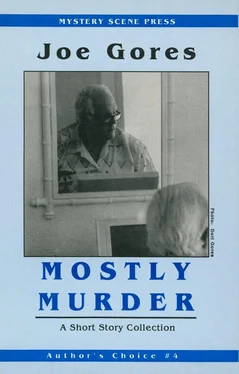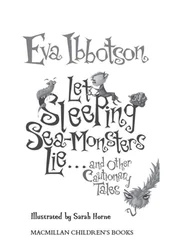About seven o’clock my brother Rod called from the doorway. I went out, shutting the door behind me. Rod was taller than me, broad and big-boned, with an athlete’s frame — but with mush where his guts should have been. He had close-set pale eyes and not quite enough chin, and hadn’t gone out for football in high school.
“My wife reported the vicious things you said to her.” It was his best give-the-teller-hell voice. “We’ve talked this over with Mother and we want you out of here tonight. We want—”
“You want? Until he kicks off it’s still the old man’s house, isn’t it’”
He swung at me then — being Rod, it was a right-hand lead — and I blocked it with an open palm. Then I back-handed him, hard, twice across the face each way, jerking his head from side to side with the slaps, and crowding him up against the wall. I could have fouled his groin to bend him over, then driven locked hands down on the back of his neck as I jerked a knee into his face; and I wanted to. The need to get away before they came after me was gnawing at my gut like a weasel in a trap gnawing off his own paw to get loose. But I merely stepped away from him.
“You... you murderous animal!” He had both hands up to his cheeks like a woman might have done. Then his eyes widened theatrically, as the realization struck him. I wondered why it had taken so long. “You’ve broken out!” he gasped. “Escaped! A fugitive from... from justice!”
“Yeah. And I’m staying that way. I know you, kid, all of you. The last thing any of you want is for the cops to take me here.” I tried to put his tones into my voice. “Oh! The scandal!”
“But they’ll be after you—”
“They think I’m dead,” I said flatly. “I went off an icy road in a stolen car in downstate Illinois, and it rolled and burned with me inside.”
His voice was hushed, almost horror-stricken. “You mean — that there is a body in the car?”
“Right.”
I knew what he was thinking, but I didn’t bother to tell him the truth — that the old farmer who was driving me to Springfield, because he thought my doubled-up fist in the overcoat pocket was a gun, hit a patch of ice and took the car right off the lonely country road. He was impaled on the steering post, so I took his shoes and put one of mine on his foot. The other I left, with my fingerprints on it, lying near enough so they’d find it but not so near that it’d bum along with the car. Rod wouldn’t have believed the truth anyway. If they caught me, who would?
I said, “Bring up a bottle of bourbon and a carton of cigarettes. And make sure Eddy and Ma keep their mouths shut if anyone asks about me.” I opened the door so Pops could hear. “Well, thanks, Rod. It is nice to be home again.”
Solitary in the pen makes you able to stay awake easily or snatch sleep easily, whichever is necessary. I stayed awake for the last 37 hours that Pops had, leaving the chair by his bed only to go to the bathroom and to listen at the head of the stairs whenever I heard the phone or the doorbell ring. Each time I thought: this is it. But my luck held. If they’d just take long enough so I could stay until Pops went; the second that happened, I told myself, I’d be on my way.
Rod and Edwina and Ma were there at the end, with Doctor hovering in the background to make sure he got paid. Pops finally moved a pallid arm and Ma sat down quickly on the edge of the bed — a small, erect, rather indomitable woman with a face made for wearing a lorgnette. She wasn’t crying yet; instead, she looked purely luminous in a way.
“Hold my hand, Eileen.” Pops paused for the terrible strength to speak again. “Hold my hand. Then I won’t be frightened.”
She took his hand and he almost smiled, and shut his eyes. We waited, listening to his breathing get slower and slower and then just stop, like a grandfather clock running down. Nobody moved, nobody spoke. I looked around at them, so soft, so unused to death, and I felt like a marten in a brooding house. Then Ma began to sob.
It was a blustery day with snow flurries. I parked the jeep in front of the funeral chapel and went up the slippery walk with wind plucking at my coat, telling myself for the hundredth time just how nuts I was to stay for the service. By now they had to know that the dead farmer wasn’t me; by now some smart prison censor had to remember Ma’s letter about Pops being sick. He was two days dead, and I should have been in Mexico by this time. But it didn’t seem complete yet, somehow. Or maybe I was kidding myself, maybe it was just the old need to put down authority that always ruins guys like me.
From a distance it looked like Pops, but up close you could see the cosmetics and that his collar was three sizes too big. I felt his hand: it was a statue’s hand, unfamiliar except for the thick, slightly down-curved fingernails.
Rod came up behind me and said, in a voice meant only for me, “After today I want you to leave us alone. I want you out of my house.”
“Shame on you, brother,” I grinned. “Before the will is even read, too.”
We followed the hearse through snowy streets at the proper funeral pace, lights burning. Pallbearers wheeled the heavy casket out smoothly on oiled tracks, then set it on belts over the open grave. Snow whipped and swirled from a gray sky, melting on the metal and forming rivulets down the sides.
I left when the preacher started his scam, impelled by the need to get moving, get away, yet impelled by another urgency, too. I wanted something out of the house before all the mourners arrived to eat and guzzle. The guns and ammo already had been banished to the garage, since Rod never had fired a round in his life; but it was easy to dig out the beautiful little .22 target pistol with the long barrel. Pops and I had spent hundreds of hours with that gun, so the grip was worn smooth and the blueing was gone from the metal that had been out in every sort of weather.
Putting the jeep in four-wheel I ran down through the trees to a cut between the hills, then went along on foot through the darkening hardwoods. I moved slowly, evoking memories of Korea to neutralize the icy bite of the snow through my worn shoes. There was a flash of brown as a cotton-tail streaked from under a deadfall toward a rotting woodpile I’d stacked years before. My slug took him in the spine, paralyzing the back legs. He jerked and thrashed until I broke his neck with the edge of my hand.
I left him there and moved out again, down into the small marshy triangle between the hills. It was darkening fast as I kicked at the frozen tussocks. Finally a ringneck in full plumage burst out, long tail fluttering and stubby pheasant wings beating to raise his heavy body. He was quartering up and just a bit to my right, and I had all the time in the world. I squeezed off in mid-swing, knowing it was perfect even before he took that heart-stopping pinwheel tumble.
I carried them back to the jeep; there was a tiny ruby of blood on the pheasant’s beak, and the rabbit was still hot under the front legs. I was using headlights when I parked on the curving cemetery drive. They hadn’t put the casket down yet, so the snow had laid a soft blanket over it. I put the rabbit and pheasant on top and stood without moving for a minute or two. The wind must have been strong, because I found that tears were burning on my cheeks.
Goodbye, Pops. Goodbye to deer-shining out of season in the hardwood belt across the creek. Goodbye to jump-shooting mallards down in the river bottoms. Goodbye to woodsmoke and mellow bourbon by firelight and all the things that made a part of you mine. The part they could never get at.
I turned away, toward the jeep — and stopped dead. I hadn’t even heard them come up. Four of them, waiting patiently as if to pay their respects to the dead. In one sense they were: to them that dead farmer in the burned-out car was Murder One. I tensed, my mind going to the .22 pistol that they didn’t know about in my overcoat pocket. Yeah. Except that it had all the stopping power of a fox’s bark. If only Pops had run to handguns of a little heavier caliber. But he hadn’t.
Читать дальше







![Джон Макдональд - The Hunted [Short Story]](/books/433679/dzhon-makdonald-the-hunted-short-story-thumb.webp)




